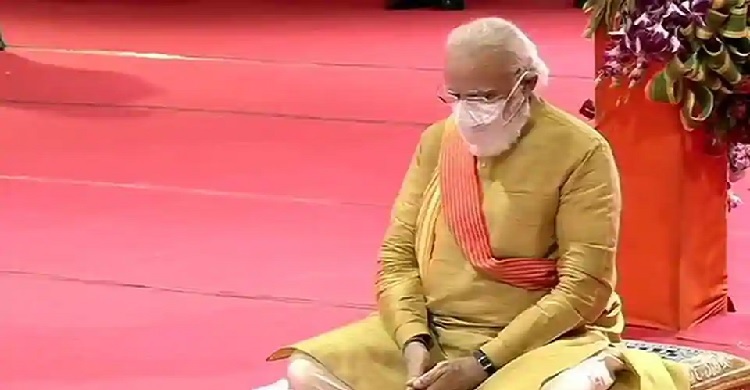Modi lays Ayodhya Ram Temple foundation

Indian PM Narendra Modi has laid the foundation stone for a Hindu temple in the northern city of Ayodhya, reports BBC.
Hindu mobs demolished a medieval mosque there in 1992, saying it was built on the ruins of a temple for Lord Ram, a revered deity.
Hindus and Muslims claimed ownership over the site for decades. Last year, the top court gave the site to Hindus, ending a decades-long legal battle.
The inauguration comes amid a massive surge in coronavirus cases in India.
The dispute, which goes back more than a century, has been one of India's thorniest court cases. The Supreme Court gave Muslims another plot of land in the city to construct a mosque.
The construction of the temple is a core promise made by Mr Modi's governing Bharatiya Janata Party (BJP), and is seen as a huge symbolic gesture for its strident Hindu nationalist base.
A local told the BBC he is "ecstatic" that Lord Ram would finally have "a proper home".
Officials have said they will follow Covid-19 protocols, but BBC Hindi's Sarvapriya Sangwan, who is at the venue, reports that crowds gathered on the road leading up to it and beyond the barricades.
People have also climbed onto rooftops to get a glimpse of the venue, and some are chanting 'Jai Shri Ram' (Hail Lord Ram). Most are not wearing masks or following social distancing, our reporter says.
But the area surrounding the event has been cordoned off, and is restricted to invitees - some 310 people, including 135 religious figures - and security personnel only.
UP Chief Minister Yogi Adityanath and other senior BJP leaders are attending the event.
The inauguration is somewhat muted affair amid the pandemic. India has been reporting record daily totals - it has recorded more than 1.9 million cases and nearly 40,000 deaths from the virus.
Uttar Pradesh, the state where Ayodhya is located, has confirmed more than 100,000 Covid-19 cases so far.







